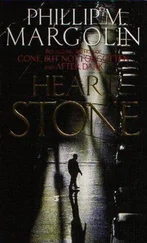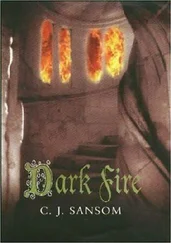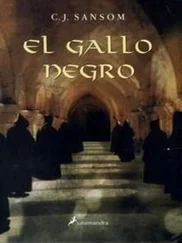Cheers rose from the streets, and a crash of cannon from the Camber sounded a welcome. I risked a glance at the King's face as he passed, fifteen feet from me. Then I stared, so different was it from four years before. The deep-set little eyes, beaky nose and small mouth were now surrounded by a great square of fat that seemed to press his features into the centre of his head. His beard was thin, and almost entirely grey. He was smiling, though, and began waving to the welcoming crowds, tiny eyes swivelling keenly over them. In that grotesque face I thought I read pain and weariness, and something more. Fear? I wondered whether even that man of titanic self-belief might think, as the French invasion force approached, what will happen now? Even, perhaps: What have I done?
Still waving, he rode away down the High Street, towards the barge that would take him to the Great Harry .
* * *
HALF AN HOUR passed before the King's entire retinue had entered the town and we were able to ride out. From the seafront more cannon resounded as the King arrived at the wharf. Beyond the gate the soldiers lining the road were now falling out of line, wiping sweat from their brows.
'Christ's blood, he's aged,' Barak said. 'How old is he now?'
I calculated. 'Fifty-four.'
'Is that all? Jesu. Imagine the Queen having to sleep with that.'
'I prefer not.'
'That I believe.' He ventured a smile and I smiled sadly back, glad the ice was broken.
We crossed the bridge to the mainland and rode quickly to the little town of Cosham. There one road continued north, past Hoyland and on to London, while another forked left to Portchester Castle. We halted. Barak said quietly, 'Let's ride on, get home.'
'No. I am still going to Portchester. An hour to ride there and back, an hour or two at the castle. I'll try and catch you up tomorrow.'
'I'm still not coming.'
'I understand. You think me mad, I know.' I tried to smile.
'I'll wait for you at the inn over there till three,' he said. 'But if you're not back by then I'll ride on.'
'Agreed.'
So I turned and rode west. I passed along the coastline for a couple of miles; slowly the high white Roman walls of Portchester Castle, set on a peninsula protruding into the head of Portsmouth Haven, became clearer. Twice I passed a company of soldiers heading in the opposite direction.
The castle, an almost perfect square of high stone walls surrounded by a moat, enclosed a site of several acres. In the centre of the walls was a large gatehouse, and at the western end an enormous square keep, immensely solid. A group of soldiers in half-armour, with swords and halberds, stood guard before the drawbridge in front of the gatehouse. I handed the letter I had written to Warner the previous night asking for an interview, to a young officer, a petty-captain I guessed. He looked at me interrogatively. 'I understand the Queen and her household have remained at Portchester,' I said.
'They're here.'
'I have been engaged on a piece of legal business for the Queen at Portsmouth. There has been a development and I need to speak with Master Warner.'
The captain stared. 'I'd have thought they'd be too busy there to bother with lawyer's quibbles.'
'This matter started before the present crisis. I think Master Warner will want to see me.'
He grunted disapproval, but beckoned a young soldier across, gave him the letter, and told him to find Warner. The soldier ran off to the drawbridge.
'Did you see his majesty enter Portsmouth?' the petty-captain asked.
'He arrived just before I left. He had a fine welcome.'
He jerked his head back at the castle behind him. 'We may have to defend this place from the French. They say there's thirty thousand of them.' He laughed bitterly, muttered 'Lawyer's quibbles,' again. We waited in silence, the hot sun beating down on us, till the young soldier ran back. 'He'll see the lawyer, sir,' he told the officer.
* * *
ONE OF THE soldiers took the horse, and the officer, with ill grace, led me across the drawbridge. We passed through the big gatehouse, guarded by more soldiers, which gave entrance to the castle and came out into a huge open space where there were yet more soldiers' tents. Men were drilling and practising with their bows on the cropped grass. Ahead of me was an enormous storehouse. The door was open and I saw it was near empty; most of the stores would have been taken to Portsmouth. A path ran straight across the enclosure to another gate on the opposite side, giving on to the harbour. Soldiers patrolled the walls and I saw the dark shapes of cannon; if the French managed to enter the harbour they might try to land here.
We turned left towards the tall inner keep; it was surrounded by a complex of smaller buildings, closed off by internal walls and protected by a continuation of the moat. The petty-captain had to explain his mission to the guards stationed there before he was allowed to lead me across the inner moat into a central yard. With the King away few people remained there. We passed through a high ornate door, then climbed a flight of steps to a great hall with a splendid hammerbeam roof. I was handed on to an official who led me down a narrow corridor into a small antechamber, telling me to wait. There were some cushioned chairs; I sat down wearily. It was quiet; a clock on the buffet ticked steadily. The sun streamed in through an arched window.
The door opened and Warner entered, my letter in his hand. He looked agitated. 'Matthew, what is this?' he asked. 'I hope it is urgent.'
I stood and bowed. 'It is. I need to speak with you, Robert.'
'Why are you still here?' he asked sharply. 'The Queen recommended you to leave. You know the King is here?'
'I saw him enter Portsmouth two hours ago.'
'Please tell me nothing more has happened at Hoyland Priory. The Queen was most concerned to learn of that woman's death.'
'A man has been arrested for Abigail Hobbey's murder, a local yeoman. I believe he is innocent.'
He waved a hand impatiently. 'The Queen cannot deal with that now.'
'And I have been warned to drop the Curteys case. By none other than Sir Richard Rich.'
I watched carefully for Warner's reaction, but he only looked surprised. 'What on earth has Rich to do with Hoyland?'
'I do not know. But I remember the day I came to Hampton Court to see the Queen, Rich was standing in a doorway in Clock Court when I left her. With Sir Thomas Seymour. They took the opportunity to bait me a little, but I thought the meeting was ill chance. Now I am not so sure.'
He shook his head. 'I can make nothing of this.'
I continued, 'I believe I mentioned I wished to take the opportunity to look into another matter down here.'
'You did.' He frowned. 'If there is a connection to the Hugh Curteys case, you should have told the Queen.'
'I have only recently discovered there may be a link. A man called Sir Quintin Priddis.'
'Matthew, the Queen cannot be troubled with this now,' he said sharply. 'The King needs her full support. You were told to leave—'
I said quickly, 'I have been investigating how a woman called Ellen Fettiplace came to be placed in the Bedlam nineteen years ago, despite there being no certificate of lunacy. Sir Quintin Priddis was involved. My trail led me to a town near the Sussex border, Rolfswood, where the body of her late father was recently discovered. It looks like murder. I have been talking to the man who was to marry her. He is now assistant purser on the Mary Rose . His name is Philip West.'
I watched Warner's face as I recited those names, but he still only looked puzzled and annoyed. 'Master West told me an extraordinary tale,' I continued. 'When he was young he was at court. He was favoured by the King and chosen to take a letter from Petworth to Hever Castle, the same summer of 1526 that Ellen's father disappeared and she went to the Bedlam. The letter was stolen by the man West was travelling with, a young lawyer in Catherine of Aragon's service.'
Читать дальше












